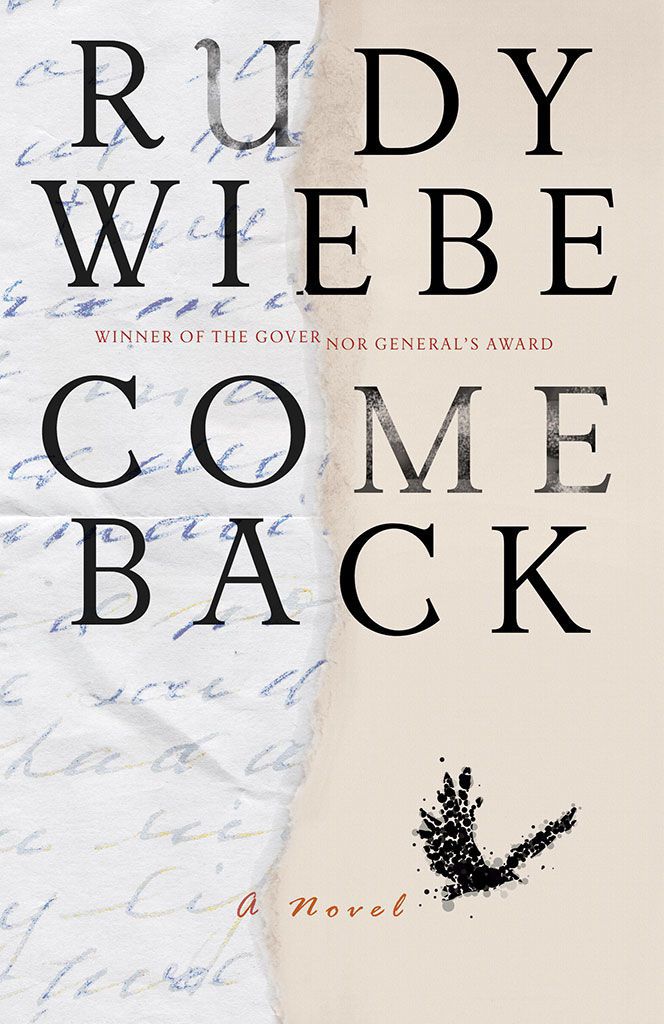 Come Back by Ruth Wiebe
Come Back by Ruth Wiebe
Review: Come Back
Rudy Wiebe, Come Back. Toronto: Alfred A. Knopf Canada, 2014.
For anyone who has lost someone they loved deeply, the phrase Come Back
is a longing and familiar refrain uttered often, if only in the quiet of your mind.
The familiarity of this novel, Come Back, is the modern story of Hal Wiens, a seventy-five year old retired university professor whose long-time wife has died seven months earlier. His two adult children both live at a distance, but they call regularly and urge him to visit. His family, which he helped to create, is loving and supportive.
What is less familiar to most of us is the death of Hal’s son, Gabriel, who took his own life some twenty-five years earlier at the age of 24. The book begins as Hal sits in a coffee shop with a friend, as he does frequently in his life as a widower, and he catches a glimpse of someone on the street that looks like Gabe.
He dashes after the young man. Unable to catch up, Hal returns home and is drawn to a collection of journals, diaries and photographs left behind by Gabe, and carefully saved and organized by Hal’s deceased wife, Yolanda.
What is the past? No more than what we together remember[?]
Hal asks as he immerses himself in the papers his son left and recalls his own stories of people and events in the last months of his son’s life.
As Hal searches in the city of Edmonton for the man who looks so much like Gabe, he reads his son’s words, drawing the reader deeper and further into this family’s tragedy. Having died so many years before, Gabriel is alive in the book with his youthful wondering and ultimately his growing desperation. He observes and ruminates and agonizes. . . .All my life I have always been alone, even with my family,
Gabe says.
And later, It’s not that I don’t want to live, it’s that somehow I’ve lost a means by which to function . . . I’m sorry, I don’t mean to hurt anyone . . .
There is also this stark realization from Gabe. I never asked to be me . . . I can refuse,
written as Hal says, in blue pen forever unchangeable.
Hal is ripped apart, reading and remembering. He looks in the mirror and a gaunt, grey-bearded man stared at him. He could not . . . comprehend . . . that as himself.
O Gabriel my son, O my son, my son Gabriel,
Hal laments, I should have known you better.
How could this have happened? Hal and Yolanda raised three children in a well-adjusted and comfortable environment. They went to church regularly, valued education, and traveled in the world. They said easily that they loved each other. They were a generation removed from Hal’s parents who suffered at the hands of Stalin and fled to rebuild their lives on a Canadian homestead.
This novel is for anyone who contemplates not only how terrible things happen in this world, but why love cannot always save people. It is a thoughtful and compassionate treatment of what we commonly call suicide
with its historical implications of wrongdoing and its religious inference of sin. Come Back is a richly layered story of friendship and family as Hal leans on his Native companion Owl and is guided by the spirit of his loving wife Yolanda through a searing emotional journey. It is also a story of faith in Christ and devotion to God.
Now 80 years old, Rudy Wiebe publishes this novel after a lifetime of literary achievement. He is a prolific writer of both fiction and non-fiction and has won numerous awards at the provincial and national level in Canada where he is well-known and a bestselling author. He has a particular place of distinction in the world of Mennonite writing. His publisher describes this as Wiebe’s most personal work; other sources note that Wiebe’s own son chose to end his life.
I particularly appreciated how Wiebe effectively tells a Mennonite story without excluding non-Mennonite readers. Here, Mennonite identity is like a regional setting. You do not need to have lived in Edmonton, Alberta or visited a cabin among the aspens of bush country to understand the story, although it may heighten your reading experience. Knowing Mennonite culture will add to your understanding of Come Back but is not necessary to catch the essence.
Most importantly, Wiebe has used the eloquence of words as a response to unanswered questions of loss and tragedy. Despite the novel’s unresolved ending, the beauty of the storytelling does not leave the reader unsatisfied.